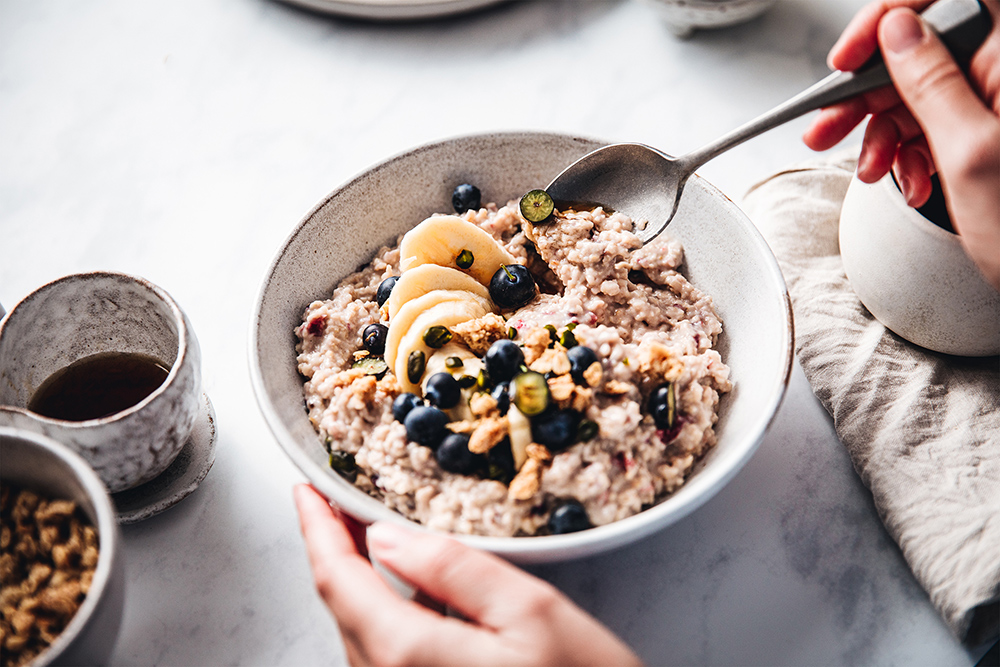
忙碌的早晨让我们急匆匆出门,没有时间吃早餐,有接近25%的美国人不吃早餐。而不吃早餐可能产生长期的负面后果。
匆匆忙忙地吃饭和晚上大吃一顿,已经是司空见惯的事情。但科学研究发现,早餐吃得像国王,午餐吃得像王子,晚餐吃得像乞丐,这可能是更健康、更长寿生活的秘诀。这种饮食方式甚至可以让你长命百岁。
2022年公布的一项研究分析了9项寿命营养学研究,即不同时间的饮食方式对精力和健康结果的影响。分析发现,早餐吃得最丰盛的人,胆固醇和血压指标都有所改善,并且减重幅度更大,而体重下降可以降低导致过早死亡的心脏病和糖尿病风险。
而晚上摄入更多食物,尤其是在睡前两个小时内用餐,导致人体更难代谢食物,会带来慢性病风险。这样做还有可能导致更难入睡和保持睡眠状态。
因此,即使在最忙碌的时候,也不要不吃早餐。
如何像长寿地区一样吃早餐
在长寿地区,如希腊伊卡里亚、意大利撒丁岛和哥斯达黎加尼科亚等在长寿研究中排在前列的区域,当地居民通常在早上吃得更丰盛,或者更早吃晚餐。
在Blue Zones网站上有一篇帖子写道:“尼科亚人经常吃两顿早餐,晚上吃简餐。而在伊卡里亚和撒丁岛,午餐是重要的一餐。许多基督复临论者遵循‘早餐吃得像国王’的原则,每天只吃两顿,一顿是在上午十点左右,另外一顿在下午4点左右。”
虽然长寿地区居民有各种各样的菜单,但比较常见的是超加工食品较少,且富含蛋白质、纤维和复合碳水化合物的饮食。许多长寿地区的居民早餐中包含完整食材、蛋白质和各种营养物质。
帖子中还写道:“长寿地区的早餐与美国人标准的鸡蛋加培根的早餐有很大区别。在哥斯达黎加,豆类是最常见的早餐之一,而在冲绳,大酱汤和大米很受欢迎。在[加州]罗马琳达,百岁老人们的早餐丰盛,经常吃麦片粥或者非传统的炒豆腐。”
虽然上夜班的上班族和作息不固定的人可能很难控制自己的用餐时间,但在上床睡觉之前选择有营养的食物和健康饮食,依旧会带来改变。
为什么用餐时间至关重要?
最近在《细胞代谢》(Cell Metabolism)发表的一篇研究论文在控制体育锻炼、睡眠和日照的情况下,按不同间隔为研究参与者提供同样的食物,研究发现,用餐时间较晚,会降低与饱腹感有关的激素水平。用餐时间较晚的一组受试者,燃烧的卡路里少于较早用餐的受试者,而且两组受试者与脂肪存储有关的基因也存在差异。
从事该项研究的弗兰克·希尔博士和尼娜·武乔维奇博士之前曾对《财富》杂志表示:“这些变化可以解释,其他研究报告提出的较晚用餐与肥胖风险增加之间存在联系的原因,并从生物学的角度为研究这些潜在机制提供了洞察。”
有一种解释是,每天人体新陈代谢水平始终在变化。早上摄入最多食物,符合我们的生理节律或自然生物钟。研究显示,有助于睡眠的激素褪黑素可能降低葡萄糖耐受性,并解释了为什么人体更难代谢深夜摄入的食物。
但你不需要为了学习长寿地区居民的做法,而大幅度调整自己的作息表。有些习惯可能适合某些人,但并不适合所有人。长寿专家和《长寿地区》(The Blue Zones)一书的作者丹·比特纳对《财富》杂志表示,另外一种优先考虑健康和长寿的方式是吃简单美味、容易烹饪的食物。
他说道:“人们往往想到的是价格昂贵的高档食物,甚至昂贵的新鲜农产品,许多美国人根本吃不到这些食材。在长寿地区,人们吃的是农家菜,也就是说他们食用的是在空地种植的豆类和绿叶菜以及全谷物食品,这些食品价格低廉。你可以大量采购。”(财富中文网)
翻译:刘进龙
审校:汪皓
忙碌的早晨让我们急匆匆出门,没有时间吃早餐,有接近25%的美国人不吃早餐。而不吃早餐可能产生长期的负面后果。
匆匆忙忙地吃饭和晚上大吃一顿,已经是司空见惯的事情。但科学研究发现,早餐吃得像国王,午餐吃得像王子,晚餐吃得像乞丐,这可能是更健康、更长寿生活的秘诀。这种饮食方式甚至可以让你长命百岁。
2022年公布的一项研究分析了9项寿命营养学研究,即不同时间的饮食方式对精力和健康结果的影响。分析发现,早餐吃得最丰盛的人,胆固醇和血压指标都有所改善,并且减重幅度更大,而体重下降可以降低导致过早死亡的心脏病和糖尿病风险。
而晚上摄入更多食物,尤其是在睡前两个小时内用餐,导致人体更难代谢食物,会带来慢性病风险。这样做还有可能导致更难入睡和保持睡眠状态。
因此,即使在最忙碌的时候,也不要不吃早餐。
如何像长寿地区一样吃早餐
在长寿地区,如希腊伊卡里亚、意大利撒丁岛和哥斯达黎加尼科亚等在长寿研究中排在前列的区域,当地居民通常在早上吃得更丰盛,或者更早吃晚餐。
在Blue Zones网站上有一篇帖子写道:“尼科亚人经常吃两顿早餐,晚上吃简餐。而在伊卡里亚和撒丁岛,午餐是重要的一餐。许多基督复临论者遵循‘早餐吃得像国王’的原则,每天只吃两顿,一顿是在上午十点左右,另外一顿在下午4点左右。”
虽然长寿地区居民有各种各样的菜单,但比较常见的是超加工食品较少,且富含蛋白质、纤维和复合碳水化合物的饮食。许多长寿地区的居民早餐中包含完整食材、蛋白质和各种营养物质。
帖子中还写道:“长寿地区的早餐与美国人标准的鸡蛋加培根的早餐有很大区别。在哥斯达黎加,豆类是最常见的早餐之一,而在冲绳,大酱汤和大米很受欢迎。在[加州]罗马琳达,百岁老人们的早餐丰盛,经常吃麦片粥或者非传统的炒豆腐。”
虽然上夜班的上班族和作息不固定的人可能很难控制自己的用餐时间,但在上床睡觉之前选择有营养的食物和健康饮食,依旧会带来改变。
为什么用餐时间至关重要?
最近在《细胞代谢》(Cell Metabolism)发表的一篇研究论文在控制体育锻炼、睡眠和日照的情况下,按不同间隔为研究参与者提供同样的食物,研究发现,用餐时间较晚,会降低与饱腹感有关的激素水平。用餐时间较晚的一组受试者,燃烧的卡路里少于较早用餐的受试者,而且两组受试者与脂肪存储有关的基因也存在差异。
从事该项研究的弗兰克·希尔博士和尼娜·武乔维奇博士之前曾对《财富》杂志表示:“这些变化可以解释,其他研究报告提出的较晚用餐与肥胖风险增加之间存在联系的原因,并从生物学的角度为研究这些潜在机制提供了洞察。”
有一种解释是,每天人体新陈代谢水平始终在变化。早上摄入最多食物,符合我们的生理节律或自然生物钟。研究显示,有助于睡眠的激素褪黑素可能降低葡萄糖耐受性,并解释了为什么人体更难代谢深夜摄入的食物。
但你不需要为了学习长寿地区居民的做法,而大幅度调整自己的作息表。有些习惯可能适合某些人,但并不适合所有人。长寿专家和《长寿地区》(The Blue Zones)一书的作者丹·比特纳对《财富》杂志表示,另外一种优先考虑健康和长寿的方式是吃简单美味、容易烹饪的食物。
他说道:“人们往往想到的是价格昂贵的高档食物,甚至昂贵的新鲜农产品,许多美国人根本吃不到这些食材。在长寿地区,人们吃的是农家菜,也就是说他们食用的是在空地种植的豆类和绿叶菜以及全谷物食品,这些食品价格低廉。你可以大量采购。”(财富中文网)
翻译:刘进龙
审校:汪皓
Busy mornings can leave us rushing out the door without making time for breakfast—nearly 25% of Americans forgo this meal. And that could have negative long-term consequences.
Eating on the go and saving your biggest meal for late in the day has become commonplace. But science has found that eating breakfast like a king, lunch like a prince, and dinner like a pauper might be the key to living longer, healthier lives. It might even help you reach 100.
Research published in 2022 analyzed nine studies on chrononutrition, or how eating at different times affects energy and health outcomes. The analysis found those who ate the most toward the earlier morning had improved cholesterol and blood pressure metrics and lost more weight, which can reduce the risk of heart problems and diabetes that lead to earlier mortality.
Saving larger meals for the evening hours, specifically eating within two hours of going to bed can make it harder for the body to metabolize the food, putting people at risk for chronic health problems. It can also make falling and staying asleep more challenging.
So even on your craziest days, you don’t want to skip breakfast.
How to eat breakfast like you live in a blue zone
Those living in the world’s blue zones—the areas at the forefront of longevity research, like Ikaria, Greece; Sardinia, Italy; and Nicoya, Costa Rica—also tend to eat more filling meals earlier in the day or have earlier dinners.
“Nicoyans often eat two breakfasts with a light dinner; Ikarians and Sardinians make lunch the big meal of the day,” reads a post on the Blue Zones website. “Many Adventists who follow the ‘breakfast like a king’ rule eat only two meals a day, one midmorning and another around 4 p.m.”
While those living in the blue zones eat varied menus, a common thread among them is meals low in ultra-processed foods and rich in protein, fiber, and complex carbohydrates. Many residents of blue zones also eat breakfasts filled with whole ingredients, protein, and nutrients.
“Breakfast in the blue zones looks vastly different than the standard American breakfast of eggs and bacon,” the post continues. “Beans are a common breakfast staple in Costa Rica, while miso soup and rice are popular in Okinawa. In Loma Linda, [Calif.], centenarians often eat a hearty breakfast of oatmeal or a somewhat nontraditional tofu scramble.”
While late-shift workers and those on varied schedules may have little control over mealtimes, choosing nutritious foods and eating well before bed can still make a difference.
Why do mealtimes matter?
Another recent study published in Cell Metabolism that controlled for exercise, sleep, and light exposure—and gave participants the same food but at varying intervals—found that eating later decreased the hormone related to feelings of fullness. The later-eating group also burned fewer calories than the earlier ones, and genes related to fat storage differed between the groups.
“Together, these changes may explain why late eating is associated with increased obesity risk reported by other studies and provide new biological insight into the underlying mechanisms,” researchers on the study Dr. Frank Scheer and Dr. Nina Vujović previously told Fortune.
One explanation is how our body’s metabolism changes throughout the day. Consuming most of our food earlier in the day aligns with our circadian rhythm or natural body clock. Research suggests melatonin, the hormone released for sleep, may decrease glucose tolerance and explain why the body has a more difficult time metabolizing late-night meals.
However, you don’t need to overhaul your schedule to follow the blue-zone way. Some habits may work for some, but not for all. Another way to prioritize health and longevity is by eating simple, easy-to-cook, and delicious foods, longevity expert and author of The Blue Zones Dan Buettner previously told Fortune.
“People tend to think [of] the expensive super foods, or even expensive fresh produce, which is out of reach for a lot of Americans,” he says. “In a blue zone, people are eating peasant food, so they’re eating the beans and the greens that are growing in vacant lots and whole grains, which are cheap. You can buy those in bulk.”






